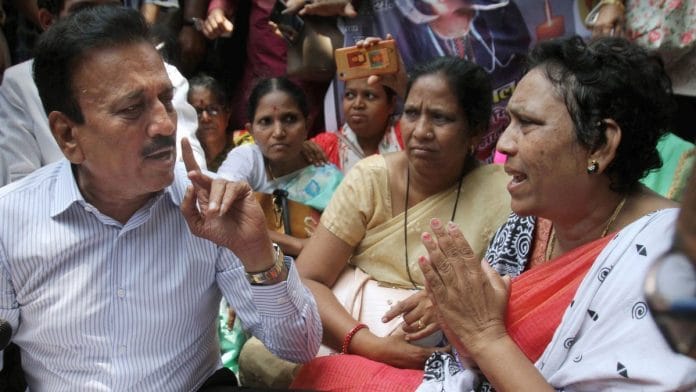New Delhi: On 22 May, 26-year-old Payal Tadvi, a doctor at the BYL Nair Hospital in Mumbai, committed suicide after she was allegedly subjected to mental torture and harassment on the basis of her caste by senior resident doctors Ankita Khandelwal, Hema Ahuja and Bhakti Mehare.
Payal Tadvi, a Tadvi Bhil Muslim, was from Jalgaon, Maharashtra, and belonged to a scheduled tribe community. In an interview with The Hindu, her mother said, “My daughter was the first woman from our community to pursue post-graduation and the first in our family to become a doctor. She was a bright student and had worked hard to reach where she was.”
ThePrint takes a look at who the Tadvi Bhils are and their current status.
Who are Tadvi Bhils?
According to the Forest Tribology and Anthropology, authored by Vinod Mhaiske, Vinayak Patil and S.S. Narkhede, the name ‘Tadvi’ means ‘one who taps the palm tree’.
The Tadvi Bhils are an Adivasi community who live in parts of Gujarat, Rajasthan, Madhya Pradesh and Maharashtra. They belong to a larger Bhil community — in Maharashtra, there are the Bhil Garasia, Dholi Bhil, Dungri Bhil, Dungri Garasia, Mewasi Bhil, Rawal Bhil, Tadvi Bhil, Bhagalia, Bhilala Pawara communities.
According to the last census in 2011, the Bhil community constitutes 21.2 per cent of Maharashtra’s Scheduled Tribe population. They speak Bhili in Maharashtra and their main profession is agriculture, while some of them also rear sheep.
Very few in the community are educated and their literacy rates remain low. According to the 2011 census data, in Maharashtra, the Bhil community has a literacy rate of 40.6 per cent. According to The Indian Express, they are among the last to receive the benefits of government schemes and reservation quotas.
They go by the surname Tadvi but in Gujarat, they also use the name Dhankas. In Maharashtra, they either take the surname Tadvi or Tetariya. While they are mainly Hindus, according to legend, many from the Tadvi Bhil community lived in the Faruqi kingdom of the medieval central Indian state and converted to Islam then.
Who are the Tadvi Muslim Bhils?
The ones who converted to Islam are the Tadvi Muslim Bhils.
According to social worker Shekhar Madhukar Sunarkar, Tadvi Bhils are unrigid in their practice of Islam in that they offer namaz but follow a traditionally and culturally Hindu lifestyle.
Razia Pate, former head of the minority cell at the Centre for Educational Studies at the Indian Institute of Education in Pune, told The Indian Express that Muslim Bhils are a nomadic tribe who lived in mountains and forests.
“They were then displaced by the Forest Rights Act and spread across Maharashtra,” Pate said. They now live mainly in Jalgaon, Nandurbar and Dhule.
Participation in Politics
The Bharatiya Tribal Party, founded in 2017 by Chhotubhai Vasava, has a large support base among the tribal Bhils. In 2018, the BTP contested its first elections in the Rajasthan assembly polls and won two seats with the support of the Congress.
In an interview with The Caravan, a BTP member, Kantilal Roat, said one of the party’s demands was the creation of a separate Bhil Pradesh carved out of the tribal areas of Rajasthan, Gujarat, Madhya Pradesh and Maharashtra. The BTP also wants a proper implementation of the Fifth Schedule that provides special protection to tribal communities.
It has also been reported that Right-wing organisations such as the RSS and VHP are trying to reconvert the Tadvi Bhil Muslims back to Hinduism and were taking advantage of their illiteracy.
In the recent Lok Sabha elections, the BJP’s Umesh Bhaiyyasaheb Patel was elected MP from Jalgaon, from where Payal Tadvi hailed. Prakash Ambedkar’s Vanchit Bahujan Aaghadi party, which finished third, has now been carrying out protests following Payal Tadvi’s death.
With inputs by Manasi Phadke
Also read: Mumbai cops suspect ‘suicide note’ of Dr Payal Tadvi was hidden or destroyed by accused






